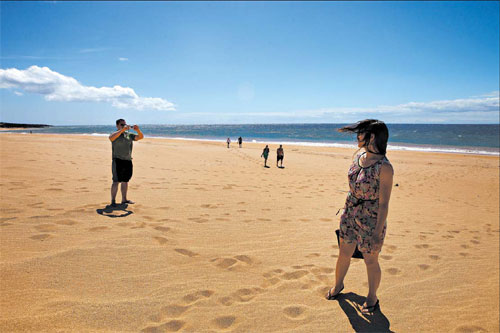An island's uncertain future
 |
|
Lanai residents worry about the intentions of the island's new billionaire owner. Lanai has 80 kilometers of beaches and is home to high-end resorts. Photographs by Monica Almeida / The New York Times |
?
 |
|
At the Four Seasons at Manele Bay on Lanai, where tourism replaced pineapple cultivation as the main economic activity. Monica Almeida / The New York Times |
In Hawaii, locals have new landlord
Lanai City, Hawaii
Lanai should be the very picture of tropical tranquillity. Just 3,135 people live on its 365 square kilometers. There are no traffic lights, movie theaters or bakeries. There is just one gas station and three main roads. It is ringed with vast and empty beaches, accessible only by four-wheel drive.
Yet for all its seeming serenity, Lanai - a privately owned island in sight of Maui's western shore - is struggling with its identity and an uncertain future after being sold to the reclusive owner of a software company.
Related: Top 10 best beaches in Southeast Asia
Ninety years ago, James Drummond Dole bought Lanai from a rancher. Under Dole, it became the world's largest pineapple plantation, known as Pineapple Island, with bristling fields and a colony of workers. When Dole moved its operations overseas in the late 1980s, Lanai turned to tourism, opening two high-end resorts where rooms can go for $1,100 a night. Bill and Melinda Gates were married at the Four Seasons at Manele Bay.
But when those resorts struggled with the recent economic downturn, the island's owner proposed building a field of 45-story turbine windmills over a quarter of the island, to produce energy to sell to Oahu. The plan polarized residents.
"It's awful, just awful," said Robin Kaye, one of the opponents, sweeping his arm across the land where the windmills would rise, a tumble of otherworldly rock formations framed by views across the Pacific to Maui and Molokai. "There are families who won't talk to each other anymore. It has really ripped us up."

Lanai's new owner is Larry Ellison, a founder of Oracle. He bought 98 percent of the island - the remainder is government property and privately owned homes - in July from David H. Murdock, whose holdings include Dole and who was behind the windmill proposal. The price was not disclosed.
Mr. Ellison now owns the gas station, the car rental agency and the supermarket. He owns the Lanai City Grille, the Hotel Lanai, the two Four Seasons resorts, two championship golf courses, about 500 cottages and luxury homes, a solar farm, and nearly every one of the small shops and cafes that line Lanai City. He owns 35,600 hectares of overgrown pineapple fields, and 80 kilometers of beaches.
But Mr. Murdock is not quite gone. He retained the option to build the windmills should he win the requisite approvals.
Mr. Ellison has yet to appear in public.
"Hey, Larry!" Sally Kaye, a former prosecutor, wrote in an open letter to the new owner published by Honolulu Civil Beat, a news site. Mr. Murdock's tourism push had been a bust "in part because we have very little water on Lanai. I'm sure your due diligence uncovered that little factoid, yes?"
Related: Romantic trip to Seychelles
"We (who live here, this being our only home) don't view this as a negative, it's simply a limitation on uncontrolled growth, which we see as a good thing," Ms. Kaye wrote. "Hope you do, too."
For all the mystery surrounding Mr. Ellison, the change of the feudal guard seems to offer the prospect of a new start for the island. Mr. Murdock, who would not comment, was demonized for reasons big and small. His worst offense might have been closing the community pool as a cost-saving measure.
One of Mr. Ellison's first acts was to reopen the pool. And the placards supporting the windmills that Mr. Murdock had placed in front of his company headquarters have vanished.
Mr. Ellison's associates describe him as drawn by the romantic mystery of a secluded island and said it was unlikely that he would embark on any project that might alter its character.
Mary Charles, who runs the Hotel Lanai, represents a segment of the island that views modest growth as essential.
"Ellison might have saved our community," she said. "We were dying. The situation was at near crisis. Some of the local people don't want to believe that."
The New York Times




















